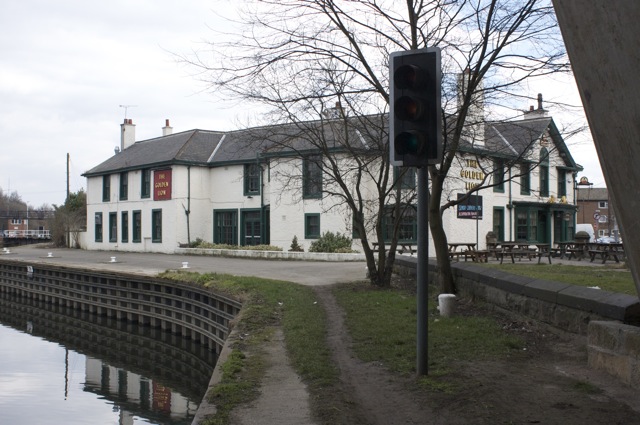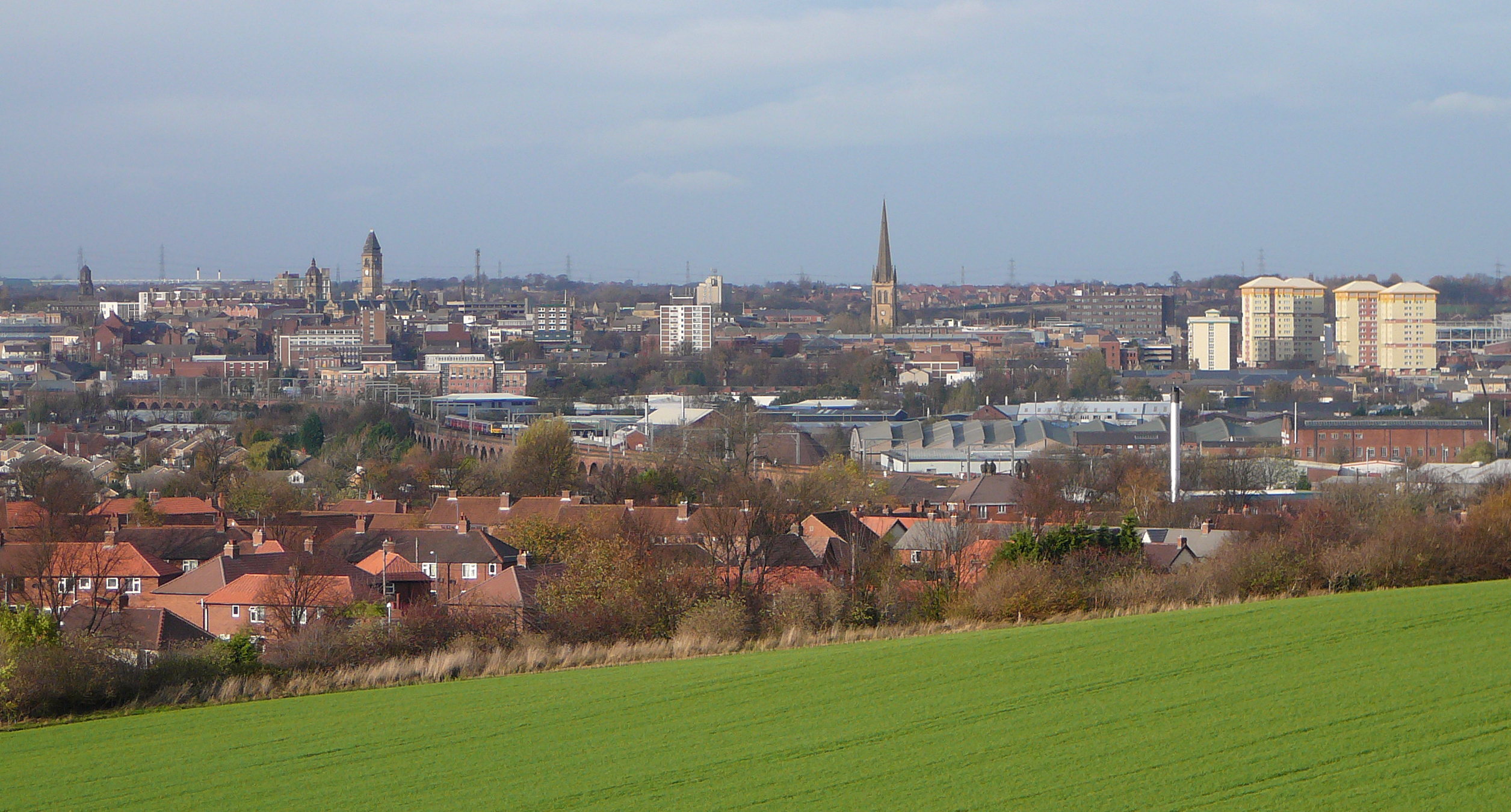|
Ferry Fryston
Ferry Fryston is a suburb of the town of Castleford in West Yorkshire, England. It is situated in the metropolitan borough of the City of Wakefield. The appropriate ward is called Airedale and Ferry Fryston. In the 18th century Ferry Fryston was a township and civil parish in the district of Pontefract. Water-Frystone, Wheldale, and Ferrybridge were hamlets within the parish. Coal mines existed within the boundaries of the former parish in New Fryston, locally known as Fryston Pit, and in Wheldale. The former closed in 1985. The area where the mine once stood has now been re-developed. Wakefield Metropolitan District Council approved plans in November 2007 for 150 new dwellings, parkland and public open space. The dwellings have still yet to be built. Wheldale colliery closed in 1987. Its buildings above ground have been demolished. The areas of both collieries have been subject to land remediation work. Most homes in the area were homes of local miners. Local authority ... [...More Info...] [...Related Items...] OR: [Wikipedia] [Google] [Baidu] |
Suburb
A suburb (more broadly suburban area) is an area within a metropolitan area, which may include commercial and mixed-use, that is primarily a residential area. A suburb can exist either as part of a larger city/urban area or as a separate political entity. The name describes an area which is not as densely populated as an inner city, yet more densely populated than a rural area in the countryside. In many metropolitan areas, suburbs exist as separate residential communities within commuting distance of a city (cf "bedroom suburb".) Suburbs can have their own political or legal jurisdiction, especially in the United States, but this is not always the case, especially in the United Kingdom, where most suburbs are located within the administrative boundaries of cities. In most English-speaking countries, suburban areas are defined in contrast to central or inner city areas, but in Australian English and South African English, ''suburb'' has become largely synonymous with what ... [...More Info...] [...Related Items...] OR: [Wikipedia] [Google] [Baidu] |
Ferrybridge
Ferrybridge is a village in West Yorkshire, England. Ferrybridge lies at a historically important crossing of the River Aire which borders the North Yorkshire village of Brotherton. It is linked to other communities by the A1, which follows the route of the Great North Road. The village falls within the Knottingley ward of Wakefield City Council. The origin of the place-name is from Old Norse and means ''bridge by the ferry''. It appears as ''Ferie'' in the Domesday Book of 1086 and as ''Ferybrig'' in 1198. Geography and geology Geologically, Ferrybridge and Knottingley are located on rich soil, over a bed of Magnesian Limestone. The area is close to junctions of the M62 and A1(M) motorways; as well as junctions on the rail network, including northward to York, south to Pontefract (and Rotherham), west to both Wakefield and Leeds, east to Goole and south-east to the East Coast Main Line; the River Aire meets the Aire and Calder navigation close to the east of the town. Th ... [...More Info...] [...Related Items...] OR: [Wikipedia] [Google] [Baidu] |
Local Authority
Local government is a generic term for the lowest tiers of public administration within a particular sovereign state. This particular usage of the word government refers specifically to a level of administration that is both geographically-localised and has limited powers. While in some countries, "government" is normally reserved purely for a national administration (government) (which may be known as a central government or federal government), the term local government is always used specifically in contrast to national government – as well as, in many cases, the activities of sub-national, first-level administrative divisions (which are generally known by names such as cantons, provinces, states, oblasts, or regions). Local governments generally act only within powers specifically delegated to them by law and/or directives of a higher level of government. In Federation, federal states, local government generally comprises a third or fourth tier of government, whereas in un ... [...More Info...] [...Related Items...] OR: [Wikipedia] [Google] [Baidu] |
Miners
A miner is a person who extracts ore, coal, chalk, clay, or other minerals from the earth through mining. There are two senses in which the term is used. In its narrowest sense, a miner is someone who works at the rock face; cutting, blasting, or otherwise working and removing the rock. In a broader sense, a "miner" is anyone working within a mine, not just a worker at the rock face. Mining is one of the most dangerous trades in the world. In some countries, miners lack social guarantees and in case of injury may be left to cope without assistance. In regions with a long mining tradition, many communities have developed cultural traditions and aspects specific to the various regions, in the forms of particular equipment, symbolism, music, and the like. Roles Different functions of the individual miner. Many of the roles are specific to a type of mining, such as coal mining. Roles considered to be "miners" in the narrower sense have included: *Hewer (also known as "cake" or "pi ... [...More Info...] [...Related Items...] OR: [Wikipedia] [Google] [Baidu] |
Wheldale Colliery
Wheldale Colliery was a coal mine located in Castleford, Yorkshire, England which produced coal for 117 years. It was accessed from Wheldon Road. After closure, the site was used to gather coal-bed methane for conversion into electricity. History The colliery was founded in 1868 when two shafts, both in diameter, were sunk to the Beeston coal seam at a depth of . Production started in 1870. One of the main investors was a Dr Holt, and so for many years the colliery was known as the "doctor's pit". In 1891 a fire in the colliery caused the death of five miners. In 1899, on the 22 June one boy, Hodgson, aged 16 died, and another, Gregg, aged 15, was injured in an incident. The Wheldale coal company and Fryston coal company amalgamated. In 1919 Wheldale coal company amalgamated with Allerton Bywater colliery to form Airedale Collieries LTD. About 1000 men and boys worked in the mine, producing about of coal each year. This was reduced in 1902 and 1903 because there was a lon ... [...More Info...] [...Related Items...] OR: [Wikipedia] [Google] [Baidu] |
New Fryston
New Fryston is a small former coal mining village in Castleford, West Yorkshire, England, located in a river bend on the south bank of the River Aire. The colliery opened in the 1870s in the grounds of the now-demolished Fryston Hall and was named Fryston, and the village was built in the 1880s to house some of the miners. At its peak, the pit employed around 1,300 miners. It closed in 1985. After the pit's closure, the colliery buildings were demolished. The settlement is also called ''Fryston village''. In 2005, a re-generation programme called the Castleford Project, carried out a number of re-developments in Fryston including what turned out to be a controversial new Village Green; these re-developments were the subject of a series of television programmes on Channel 4. See also * List of Yorkshire Pits *Richard Monckton Milnes, 1st Baron Houghton Richard Monckton Milnes, 1st Baron Houghton, FRS (19 June 1809 – 11 August 1885) was an English poet, patron of liter ... [...More Info...] [...Related Items...] OR: [Wikipedia] [Google] [Baidu] |
Coal Mine
Coal mining is the process of extracting coal from the ground. Coal is valued for its energy content and since the 1880s has been widely used to generate electricity. Steel and cement industries use coal as a fuel for extraction of iron from iron ore and for cement production. In the United Kingdom and South Africa, a coal mine and its structures are a colliery, a coal mine is called a 'pit', and the above-ground structures are a 'pit head'. In Australia, "colliery" generally refers to an underground coal mine. Coal mining has had many developments in recent years, from the early days of men tunneling, digging and manually extracting the coal on carts to large open-cut and longwall mines. Mining at this scale requires the use of draglines, trucks, conveyors, hydraulic jacks and shearers. The coal mining industry has a long history of significant negative environmental impacts on local ecosystems, health impacts on local communities and workers, and contributes heavily to th ... [...More Info...] [...Related Items...] OR: [Wikipedia] [Google] [Baidu] |
Nature Replaces Industry - Geograph
Nature, in the broadest sense, is the physical world or universe. "Nature" can refer to the phenomena of the physical world, and also to life in general. The study of nature is a large, if not the only, part of science. Although humans are part of nature, human activity is often understood as a separate category from other natural phenomena. The word ''nature'' is borrowed from the Old French ''nature'' and is derived from the Latin word ''natura'', or "essential qualities, innate disposition", and in ancient times, literally meant "birth". In ancient philosophy, ''natura'' is mostly used as the Latin translation of the Greek word ''physis'' (φύσις), which originally related to the intrinsic characteristics of plants, animals, and other features of the world to develop of their own accord. The concept of nature as a whole, the physical universe, is one of several expansions of the original notion; it began with certain core applications of the word φύσις by pre-Soc ... [...More Info...] [...Related Items...] OR: [Wikipedia] [Google] [Baidu] |
Town
A town is a human settlement. Towns are generally larger than villages and smaller than cities, though the criteria to distinguish between them vary considerably in different parts of the world. Origin and use The word "town" shares an origin with the German word , the Dutch word , and the Old Norse . The original Proto-Germanic word, *''tūnan'', is thought to be an early borrowing from Proto-Celtic *''dūnom'' (cf. Old Irish , Welsh ). The original sense of the word in both Germanic and Celtic was that of a fortress or an enclosure. Cognates of ''town'' in many modern Germanic languages designate a fence or a hedge. In English and Dutch, the meaning of the word took on the sense of the space which these fences enclosed, and through which a track must run. In England, a town was a small community that could not afford or was not allowed to build walls or other larger fortifications, and built a palisade or stockade instead. In the Netherlands, this space was a garden, mor ... [...More Info...] [...Related Items...] OR: [Wikipedia] [Google] [Baidu] |
City Of Wakefield
The City of Wakefield is a local government district with the status of a city and metropolitan borough in West Yorkshire, England. Wakefield, the largest settlement, is the administrative centre of the district. The population of the City of Wakefield at the 2011 Census was 325,837. The district includes the ''Five Towns'' of Normanton, Pontefract, Featherstone, Castleford and Knottingley. Other towns include Ossett, Horbury, Hemsworth, South Kirkby and Moorthorpe and South Elmsall. The city and district are governed by Wakefield Metropolitan District Council from headquarters in County Hall. In 2010, Wakefield was named as the UK's third most musical city by PRS for Music. Economy The economic and physical condition of several of the former mining towns and villages in Wakefield District have started to improve due to the booming economy of Leeds – and an increase in numbers of commuters to the city from the sub-region – and a recognition of undeveloped assets. For i ... [...More Info...] [...Related Items...] OR: [Wikipedia] [Google] [Baidu] |







.jpg)
.jpg)
